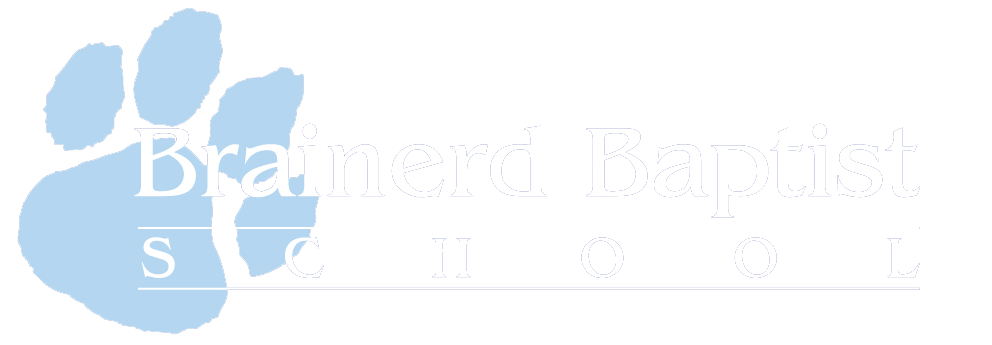In 2020 Brainerd Baptist School finished construction of a new learning space called “The Hub” which holds our library, STEM space, and Learning Center. The Learning Center was created to help serve students who need additional help in the classroom. Their work ranges from students who may need extra help in a particular subject to working with students with intervention plans or IEPs. It is under the direction of Missy Henson and Gena Bailey, Mindi Shoup, and Cathy Creed also work with students each day.
Additionally, we have partnerships with multiple professionals who provide other services on our campus for students. such as speech, occupational therapy, and psychological testing are conducted through this office. The following organizations work in partnership with our Learning Center:
-
neuroBridge LLC
*neuroBridge provides therapy services at the school and works closely with teachers, parents and administrators for a team approach. Complete academic evaluations available.
Services: OT, SLP, Clinical Psychologist
Contact: Margaret Hopping OTR/L, Co-Founder
mhopping@neurobridgellc.com
423-380-9087
…….
SLR Center
5819 Winding Lane #101, Hixson
*provides therapy for speech, language, and reading, and complete academic evaluations
Contact: Rebecca Iwanczyk
office@chattanoogaspeech.com
423-877-5042
…….
True North
*provides complete academic evaluation, can include classroom observations
Contact: April Nessin, Clinical Psychologist
april@truenorthts.com
423-271-9878
A complete academic evaluation is a comprehensive assessment of a student’s abilities and skill levels. It gives parents and teachers a thorough picture of how a student performs in an academic setting. The goal of this type of testing is to provide parents, teachers, and other service providers with a clear picture of a child’s unique strengths and needs in order to provide the best possible education. Among other things, these tests can help identify a student’s attention, auditory and visual processing, executive functioning, fluid reasoning, phonological awareness and other reading processes, language skills like written expression and spelling, short term memory and long term retrieval. This article provides a clear description of the what's and why’s of an academic evaluation.
Each full evaluation includes:
an extensive written report with a summary and interpretation of each assessment
a detailed diagnosis of the condition
detail of individual strengths and weaknesses
specific individualized recommendations designed to meet the student’s needs
A conference is held with the family and/or student to explain the results, conclusions, and prescriptive instructional recommendations for the home, school, or possible tutor with referrals to other appropriate professionals. A differential diagnosis is dependent upon a variety of criteria. Regardless of whether or not the participant is diagnosed with a particular pattern, the resulting data and report are critical for future instructional planning.
Why pursue an educational evaluation?
Assessment is the process by which educational decisions are made. Parents and schools request testing for a wide variety of reasons including:
screening and identification
diagnosis and potential eligibility for special programs
determination of appropriate accommodations and modifications
instructional planning
development and placement of Individualized Educational Program (IEP)
reevaluation to measure progress
selection of best education option
support of application to private school
determination of appropriate grade placement for young students
basic aptitude testing for college-bound students
post-secondary educational planning
Expected Outcomes of Testing
The client is provided with a detailed written report which includes the following information:
present level of performance (baseline data)
deeper understanding of how the student learns
diagnosis/description of a condition
design of appropriate educational program/placement
appropriate research-based recommendations for intervention
referrals to other specialists and related agencies
specialized program for home, school, and tutor/academic therapist
specific accommodations to provide the student with equal access to educational opportunities
extensive detailed report with specific Individualized Educational Program (IEP) development to share with other professionals
clear interpretation of findings
Private and Public Evaluations
Students are entitled to evaluations at no charge when the tests are administered by the school district in which they live. However, school evaluations tend to be designed and completed in order to determine if a student qualifies for a particular program.
Private evaluations tend to be much more extensive and complex. Therefore, private evaluations often provide much more necessary information for making specific instructional recommendations. The private evaluator often has greater access to a variety of tests rather than being limited to those selected by the school.
The private evaluator can make recommendations that are the most appropriate for that student rather than those the school has available. Furthermore, the private evaluator can gain information that will allow for a description of a condition that may or may not be defined as a disability or determine eligibility for services. Detailing the nature of the disability is nonetheless important in making instructional decisions.
Private evaluations should include in-depth analyses of a student’s achievement, ability to process information, learning styles, and strengths and weaknesses and how to use this data to improve the student’s academic performance.
